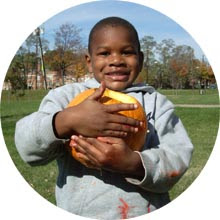 A teacher brings a field trip she couldn't take into the classroom. Students take a stand in the name of free expression. Each of these true stories was a risk, and the risk-takers experienced the rewards.
A teacher brings a field trip she couldn't take into the classroom. Students take a stand in the name of free expression. Each of these true stories was a risk, and the risk-takers experienced the rewards.The Risk: Carol teaches Pre-K in the inner city. Her students have never been to a pumpkin patch. She wants to do the traditional "trip to a farm" but due to budgetary constraints and concerns that "out of class time = no learning" she's not allowed to take the students this year. Carol is undeterred. She takes a weekend drive to a pumpkin patch and with her own money buys enough pumpkins for every student in the class. She also buys a bushel of apples, several hay bales, and some corn stalks. "If I can't take them to the farm, I"ll bring the farm to them," she says. On Monday morning she arrives at school before the sun comes up and sets to work creating a "pumpkin patch" on the playground. She covers the pumpkins with hay so the students can hunt for them, and hides the apples as well. She ties the cornstalks to tree trunks and sets up a paint station, a clay station, apumpkin carving station, and a giant tarp/tent. When the students arrive they spend the morning "on the farm."
The Reward: "I might get written up for insubordination," Carol says, "but to see the smiles on my students' faces - that made the whole thing worth it." She recognizes that the learning experience her students had that morning trumps whatever she could have taught them about math or writing.
The Risk: Richard walked into high school one day with his usually blonde hair dyed bright green. His hair caused quite a sensation and, in the eyes of his principal, quite a distraction, so by the time 4th period rolled around he was in the office being suspended. I was Richard's American Literature teacher and it just so happened that we were deep in a week-long debate about the virtues and drawbacks of our American freedoms as described in the Constitution and Bill of Rights. When Richard was missing from class, the students shared his story. They were indignant that he should be suspended for what they considered his right to free expression. I encouraged them to use the power of the pen to share their concerns with the principal. They did, but their letter was met with the explanation that the rights of an American citizen and the rights of high school students are not the same. So, they took an even bigger risk. After school they met at one student's house and the entire class dyed their hair a wonderful rainbow of florescent colors.
The Reward: When this group (representing the highest achieving students in the school) marched in the next day, there were too many students to suspend (and too many influential parents involved). Richard was allowed back in school and the students celebrated what they considered a triumph of their rights as free citizens and the potential power of social activism.
Neither of these risks was particularly "academic" and yet it would be difficult to argue that learning didn't take place in each example. While it's never a good idea to take risks that put students in danger, those that challenge their minds and encourage them to seek their own pathways for learning are undeniably valuable.
Ultimately, shouldn't learning that stretches one's mind, takes one to new places, and opens new doors - be exactly the kind of learning we're supposed to do in school?

No comments:
Post a Comment